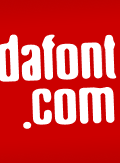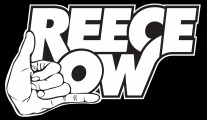Forum
393 posts Identified fonts
Posts by conman1985
I think the minor differences are more a result of Castcraft OPTIFonts poor digitization of it. They are not known for producing quality fonts and I would not be surprised if they simply made their version from the sample in Dan X. Solo's 1979 book.
4-Style Digital Font Family:
OPTI Limited View
OPTI Limited View Open
OPTI Limited View Expanded
OPTI Limited View Expanded Open
Just discovered that Roc Mitchell most likely created the original typeface called Logos/Logostyle. We can now do away with the Limited View moniker.
Hopefully, you can see some of it here:
http://web.archive.org/web/20020402084057/http://www.rocmitch.com/rocmitch/fonts/LogoStyle.htm
When Microgramma was designed in 1952 it went on to become a popular typeface to advertise future technology and science fiction. Further revisions in 1962 added a lowercase and it's popularity increased to the point of overexposure. Now named Eurostile, every technology company and corporation was using it. This lead to 1970's designers finding creative ways to make distinct variants that stood out. One such example is Corporate Image/Corporate URW/Paratype Mania (1971, Phil Martin/Roc Mitchell - Alphabet Innovations International, Inc.), which is clearly borrowing from Microgramma/Eurostile, yet offering a sleeker look. Another variant born out of this trend would have been Logos/Logostyle/Limited View.
10-Style Digital Font Family:
Logos
Logos Oblique
LogoStyle
LogoStyle Oblique
LogoText Thin
LogoText Thin Oblique
LogoText
LogoText Oblique
LogoText Medium
LogoText Medium Oblique
From 1970 until 1974, Roc Mitchell designed typefaces for Phil Martin's Alphabet Innovations.
"I did most of my font design work in the 70's, at a time when the process was more photographic than computerized. My son Paul did the computer work necessary to put my type fonts into computer format, learning as he went."
Roc Mitchell, 1999
Roc Mitchell Design
rocmitchell@home.com | rocfonts@rocmitch.com
Other examples of use:
Nikon Coolscan Film Scanners + Accesories
ColecoVision logotype (probably the reason Nintendo chose to use it too)
Tangerine Dream - Exit (1981) album cover
STAR Engineering Inc. logotype (1972)

Edited 7 times. Last edit on Sep 09, 2014 at 04:49 by conman1985
4-Style Digital Font Family:
OPTI Limited View
OPTI Limited View Open
OPTI Limited View Expanded
OPTI Limited View Expanded Open
Just discovered that Roc Mitchell most likely created the original typeface called Logos/Logostyle. We can now do away with the Limited View moniker.
Hopefully, you can see some of it here:
http://web.archive.org/web/20020402084057/http://www.rocmitch.com/rocmitch/fonts/LogoStyle.htm
When Microgramma was designed in 1952 it went on to become a popular typeface to advertise future technology and science fiction. Further revisions in 1962 added a lowercase and it's popularity increased to the point of overexposure. Now named Eurostile, every technology company and corporation was using it. This lead to 1970's designers finding creative ways to make distinct variants that stood out. One such example is Corporate Image/Corporate URW/Paratype Mania (1971, Phil Martin/Roc Mitchell - Alphabet Innovations International, Inc.), which is clearly borrowing from Microgramma/Eurostile, yet offering a sleeker look. Another variant born out of this trend would have been Logos/Logostyle/Limited View.
10-Style Digital Font Family:
Logos
Logos Oblique
LogoStyle
LogoStyle Oblique
LogoText Thin
LogoText Thin Oblique
LogoText
LogoText Oblique
LogoText Medium
LogoText Medium Oblique
From 1970 until 1974, Roc Mitchell designed typefaces for Phil Martin's Alphabet Innovations.
"I did most of my font design work in the 70's, at a time when the process was more photographic than computerized. My son Paul did the computer work necessary to put my type fonts into computer format, learning as he went."
Roc Mitchell, 1999
Roc Mitchell Design
rocmitchell@home.com | rocfonts@rocmitch.com
Other examples of use:
Nikon Coolscan Film Scanners + Accesories
ColecoVision logotype (probably the reason Nintendo chose to use it too)
Tangerine Dream - Exit (1981) album cover
STAR Engineering Inc. logotype (1972)

Edited 7 times. Last edit on Sep 09, 2014 at 04:49 by conman1985

Phototype preview of Limited View is from "Sans Serif Display Alphabets" by Dan X. Solo, Dover Publications (1979). There are no other known previews, except the use of it in logos and titles during the 1970's and 1980's when Phototypesetting was prevalent. Eurostile Bold Extended would be an acceptable substitute for the characters that are different. It is likely the inspiration for Limited View anyhow. There are some slight height differences, and you'd need to smooth out some of the inner edges, but I could see it working.
Given that;
a) the NES logo and the Arthur C. Clarke book titles both use these identical alternate characters
b) the nature of phototype is to have an entire typeface on one filmstrip/reel (wasn't easy to change fonts in the middle of typesetting)
and c) the Eurostile characters aren't 100% exact - big image here: https://www.flickr.com/photos/25754471@N08/8652442370/sizes/o/
one must deduce that the original phototype filmstrip came with these alternates.
Take a look at this NES NTF2 Test Cartridge. All the characters, minus the alternate R, D, and F, match Limited View.

Big image of NES Power Pad using numbers from Limited View:
https://img0.etsystatic.com/000/0/5368045/il_fullxfull.336713324.jpg
Edited 6 times. Last edit on Sep 07, 2014 at 17:15 by conman1985
Yes, there are a few differences. These are minor. The result of the original 70's phototype having alternate/interchangeable characters that were not digitized. The "Islands In The Sky" sample above shows the alternate R, A, and D. Worth noting that the K in that sample also matches Limited View.
Take a look at the POWER button on the original console:

Notice that the W also matches Limited View.

Also, Airlock (Computer Safari) is a stencil font based on Limited View. Probably too modified to use though.
Edited 2 times. Last edit on Sep 07, 2014 at 14:13 by conman1985
Take a look at the POWER button on the original console:

Notice that the W also matches Limited View.

Also, Airlock (Computer Safari) is a stencil font based on Limited View. Probably too modified to use though.
Edited 2 times. Last edit on Sep 07, 2014 at 14:13 by conman1985
@koeiekat I respectfully disagree. OPTI Limited View is the ONLY digitization of the original phototype used at the time. We're talking 1983. Limited View has been around as early as 1979, possibly even earlier (see "Sans Serif Display Alphabets" by Dan X. Solo, Dover Publications). The only major difference is the R which had an alternate in pre-digital form, as you can see here on the cover for Arthur C. Clarke's Islands In The Sky:

The curves on the inside of the E's and T's are the giveaway for ID. No other typeface comes closer, and I can safely say that Limited View is a much closer match than NES Controller. Comparison image:

Edited 2 times. Last edit on Sep 07, 2014 at 13:37 by koeiekat

The curves on the inside of the E's and T's are the giveaway for ID. No other typeface comes closer, and I can safely say that Limited View is a much closer match than NES Controller. Comparison image:

Edited 2 times. Last edit on Sep 07, 2014 at 13:37 by koeiekat
Original is OPTI Limited View.
Original is OPTI Limited View.
Zapper is Futura Extra Bold Italic.
Edited 2 times. Last edit on Sep 07, 2014 at 10:47 by drf
Identified font: Futura
Edited 2 times. Last edit on Sep 07, 2014 at 10:47 by drf
Entertainment System is OPTIFonts Limited View (original) or NES Controller (remake).
Edited on Sep 07, 2014 at 10:47 by drf
Suggested font: NES Controller
Edited on Sep 07, 2014 at 10:47 by drf
Suggested font: Kart
Edited 2 times. Last edit on Sep 06, 2014 at 16:30 by drf
Suggested font: SF Sports Night (Already suggested here)
Edited 2 times. Last edit on Sep 06, 2014 at 16:19 by drf
Identified font: Machine
Berthold Akzidenz-Grotesk Super with added weight and the counters blacked out.
Suggested font: Akzidenz-Grotesk Super
All times are CEST. The time is now 02:59












